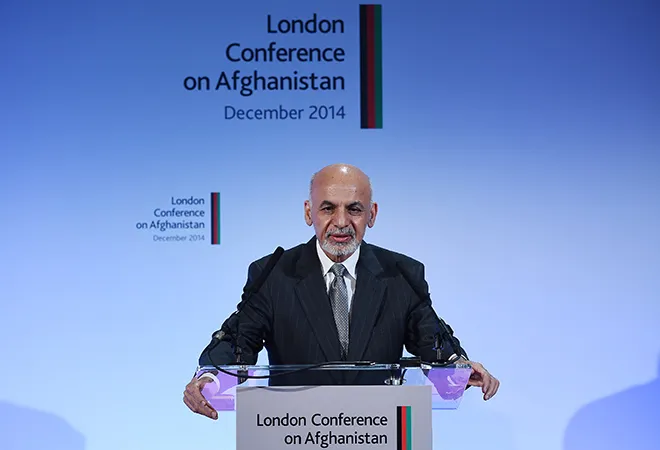-
CENTRES
Progammes & Centres
Location
History is testament to the fact that no number of guarantees or pledges can deter the Taliban from reneging on promises.

In late January 2019, the US Special Representative for Afghanistan Reconciliation Zalmay Khalilzad, steered the Qatar talks with the Taliban towards a draft settlement framework for a potential peace deal, collectively outlined although not yet agreed upon by both parties. Even short of an agreement, the framework itself is being considered a major breakthrough in peace negotiations with the insurgent group so far. It focuses on the insurgents guaranteeing that Afghan soil is never again used by terrorists to devise attacks, in particular against the US, agreement to a ceasefire, and direct talks with the Afghan government, following which the US would initiate a complete troop withdrawal from Afghanistan. As a recent report suggests, the Taliban have only provided guarantees for the first of the US preconditions and are yet to accept the rest.
In the history of reconciliation with the Taliban, it is difficult to find even a single instance of a negotiated settlement leading to sustained peace. Either the successive attempts at settlement failed to be accepted by the insurgents, or led to the assassination of those that did agree to a peace deal with the Afghan government.
For instance, many of the moderate elements of the Taliban, who were integrated into the Afghan government or convinced to serve as provincial members of the High Peace Council, based on the Afghan Peace and Reintegration Programme (APRP), born out of the London conference of 2010, either faced repeated threats, or were assassinated by the hardliners. The Paris conference, comprising of representatives of the major political factions of Afghanistan along with the delegates from the High Peace Council, and the Kyoto meeting, which saw consultations take place between the head of HPC Masoom Stanekzai and active Taliban representatives, both held in 2012, did not witness agreement on any contentious issues either.
Given the track record of the Taliban, which is one of reneging on promises, pledges and commitments, the key question to ponder upon is as to why the Taliban have agreed to negotiate a peace deal with the US in the first place, given that they are increasingly emerging as winners in their fight against the coalition of the Afghan government and US forces.
For the Taliban, engaging in conciliatory talks with the US, which is likely to precede a complete US pull-out from Afghanistan, serves their long term objective of fighting and subsequently defeating the ill-equipped and inadequately trained Afghan forces, in the absence of American protection.
The American willingness to pull out of Afghanistan, or at the very least, initiate a troop drawdown, stems from a muted realisation that the present day scenario is one of an ‘imbalanced stalemate’. In other words, whereas on the one hand neither party is being able to secure an outright military victory, the balance of power is undoubtedly tilted in favour of the Taliban. Moreover, maintenance of troops in Afghanistan is not only expensive for the US, but also the numbers are neither small enough so as to not be perceived as a looming threat by the Taliban, nor large enough to change the course of events. A complete US withdrawal from Afghanistan then serves America’s limited objective of securing an exit without humiliation, and would be a move aligned with the demands of the Taliban, who wish to decide the future for Afghanistan on their own terms, in the absence of foreign actors, such as the US.
The latest round of negotiations that took place in Moscow on February 6, 2019, between the Taliban and senior Afghan leaders, did not witness the participation of the Afghan government, evoking a wave of anger from the latter. The talks did not arrive upon a suitable timeline for American withdrawal, but produced a nine-point “basic vision” for post-peace Afghanistan, that emphasised on a commitment to creating a strong yet inclusive central government, and respect for the fundamental rights of the citizens.
There are fears that negotiations with the Taliban, taking place in the absence of US representatives and Afghan government officials, may further polarise an already fragmented Afghan socio-political milieu, given that they are being attended by Afghan leaders who are vying for electoral legitimacy in the upcoming presidential elections in Afghanistan. President Ghani’s office has proclaimed that negotiations in the absence of official Afghan representation will further undermine the fragile Afghan political apparatus, and any peace deal that comes out of such meetings will be unable to secure government sanction at the time of implementation, essentially being rendered an exercise in vain. Moreover, President Ghani is not in favour of a complete US troops pull-out immediately, and has even written to Trump offering a significant cost reduction in the maintenance of US troops on Afghan soil. The offer of reduced costs for continued presence of US soldiers in Afghanistan has garnered a fair bit of criticism in Afghan political circles, as the US is believed to be the biggest ally of the Ghani-led government, a relationship that potentially holds the key to Ghani’s re-election in July 2019.
Therefore, the success of a negotiated peace deal with the Taliban will hinge on the sustainability of the power-sharing arrangement that emerges as a result of the on-going negotiations.
If integrated into the official decision-making apparatus of the country, it will be safe to assume that the Taliban would ensure they wield a significant amount of political power, and would demand complete control of their core territorial bases such as Helmand, Uruzgan and Kunduz. Having said that, negotiated peace translated into a political settlement with the Taliban is likely to be short-lived, as there is little to no assurance that the group would not resort to their old, barbaric ways, or even be able to secure popular legitimacy. If the past record of the Taliban is anything to go by, no number of guarantees or pledges can assure the world that the insurgents would not renege on their promise. With or without the US, therefore, Afghanistan is undoubtedly going to be home to enduring political instability and insurgent violence, in the foreseeable future.
The views expressed above belong to the author(s). ORF research and analyses now available on Telegram! Click here to access our curated content — blogs, longforms and interviews.

Shubhangi Pandey was a Junior Fellow with the Strategic Studies Programme at Observer Research Foundation. Her research focuses on Afghanistan particularly exploring internal political dynamics ...
Read More +